An Intimate Reading of The Gadfly Under the Open Sky [Esp/Eng]
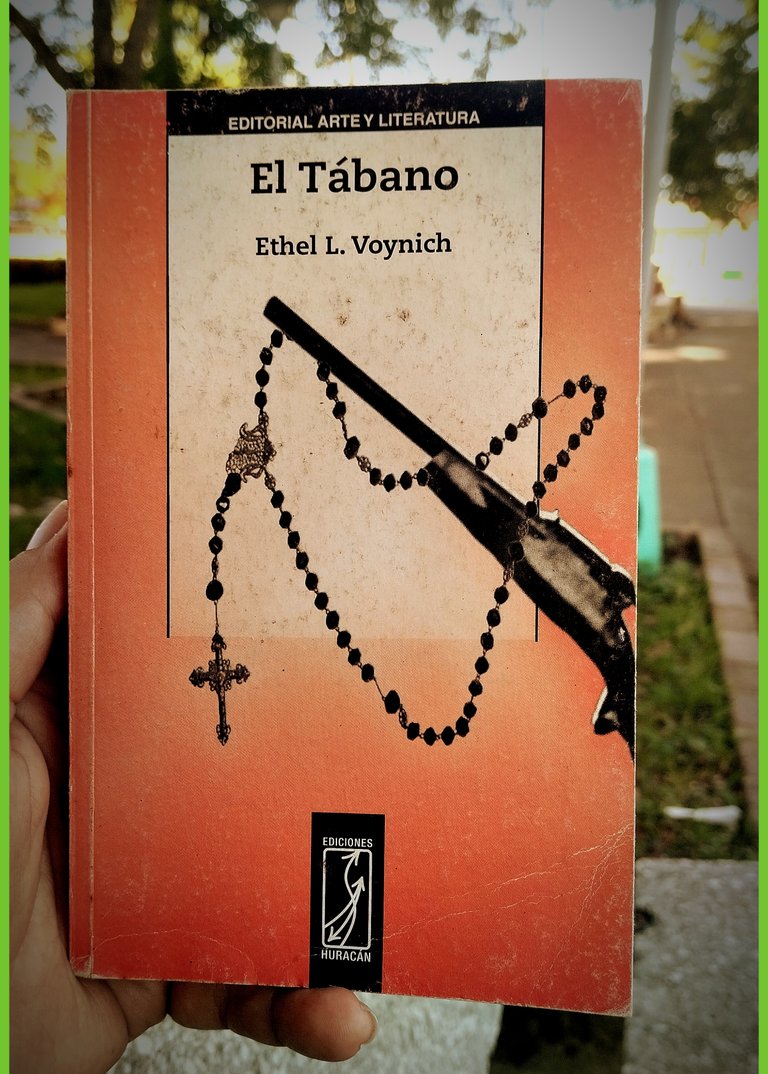
Some books demand certain settings to be fully enjoyed, and The Gadfly by Ethel Lilian Voynich is one of them. This is not a novel to devour within the four walls of a room or under the artificial light of a lamp; it is a work that calls for the open air, the rustle of leaves, and the tranquility of a park bench. For several days, this book has accompanied my outdoor readings, and I must admit that few reading experiences have been as intense as this one.
The Gadfly transports us to 19th-century Italy, when independence and revolutionary movements against Austrian rule were on the rise. Precisely because of the author's sympathy for these political struggles, she chose this plot, which combines romance, tragedy, and a profound analysis of human nature under oppression.
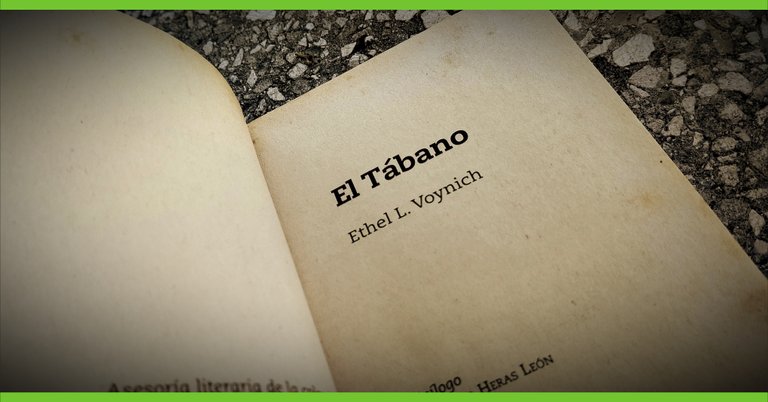
The central axis of the book revolves around the evolution of the main character, Arthur, an idealistic young man who, after being betrayed, becomes the Gadfly, a sarcastic revolutionary physically marked by pain yet tireless in his fight for freedom.
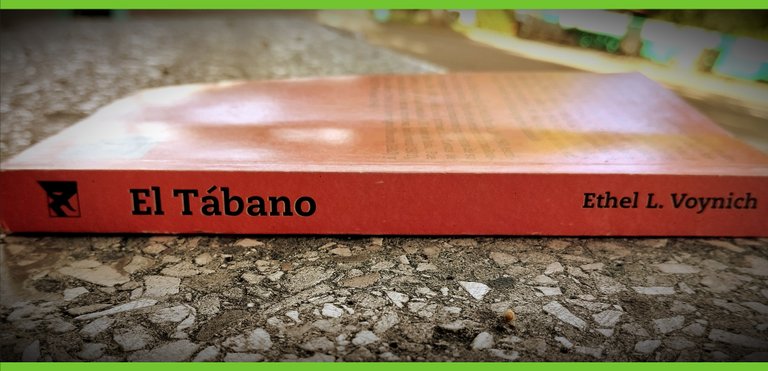
Reading The Gadfly in a park was no casual decision. There is something in Voynich's prose that resonates better in open spaces. Perhaps it is the descriptions of Italian landscapes, the dialogue laden with ideals, or the reflections on sacrifice, but the truth is that on a quiet afternoon under a leafy tree, the words of Arthur, the protagonist, take on a special power.
The novel alternates between scenes of political tension and deeply emotional intimate moments. That contrast between the violence of revolutionary struggle and the tenderness of characters like Gemma, Arthur's youthful love, is best enjoyed when surrounded by nature. The reason may be that the trees, as silent witnesses, add melancholy to the reading.
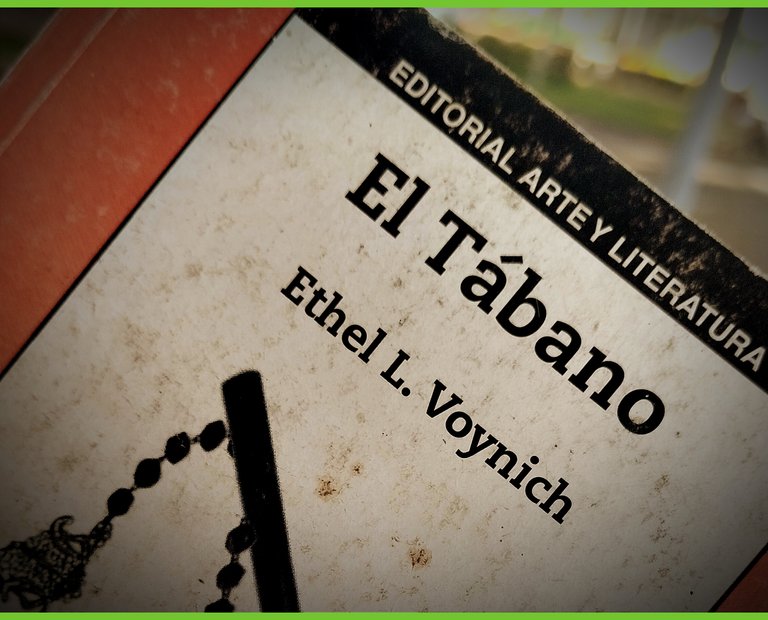
Arthur is painful. His transformation from an innocent young man to a broken yet indomitable man is written with a rawness that leaves an impact. Gemma, on the other hand, is a complex character, with her strength and guilt, making her feel real. Meanwhile, Father Montanelli emerges as a tormented religious figure, elevating the novel to near-Shakespearean levels.
Beyond the political struggle, this is a novel about faith and how it can be betrayed. Arthur loses everything, even his identity, but in that suffering, he finds a reason to keep fighting, wielding sharp sarcasm that also serves as a shield of brutal honesty.
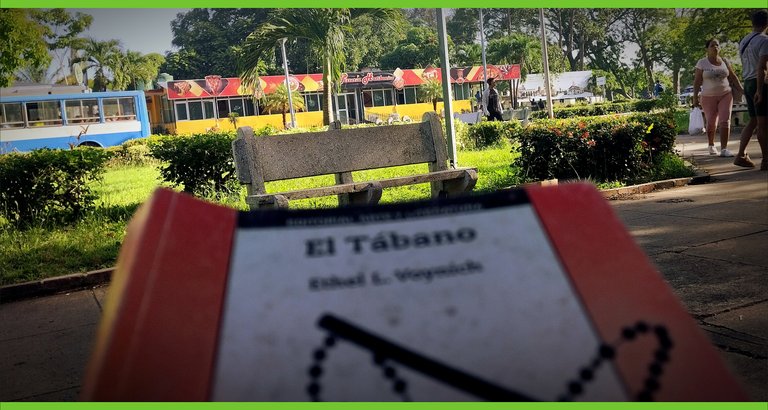
And then, after all of this, redemption emerges as the essence of the story, not in a religious sense, but in a human one: Arthur does not seek forgiveness, but justice. True, the ending is devastating, but there is a tragic beauty in his sacrifice.
I started and finished this book in the park. Not all books benefit from a natural setting, but The Gadfly does. I feel that reading it alone in my room would have left me suffocated. This novel speaks of hope and despair, scars and resistance, and something about the open air makes these themes resonate more powerfully.
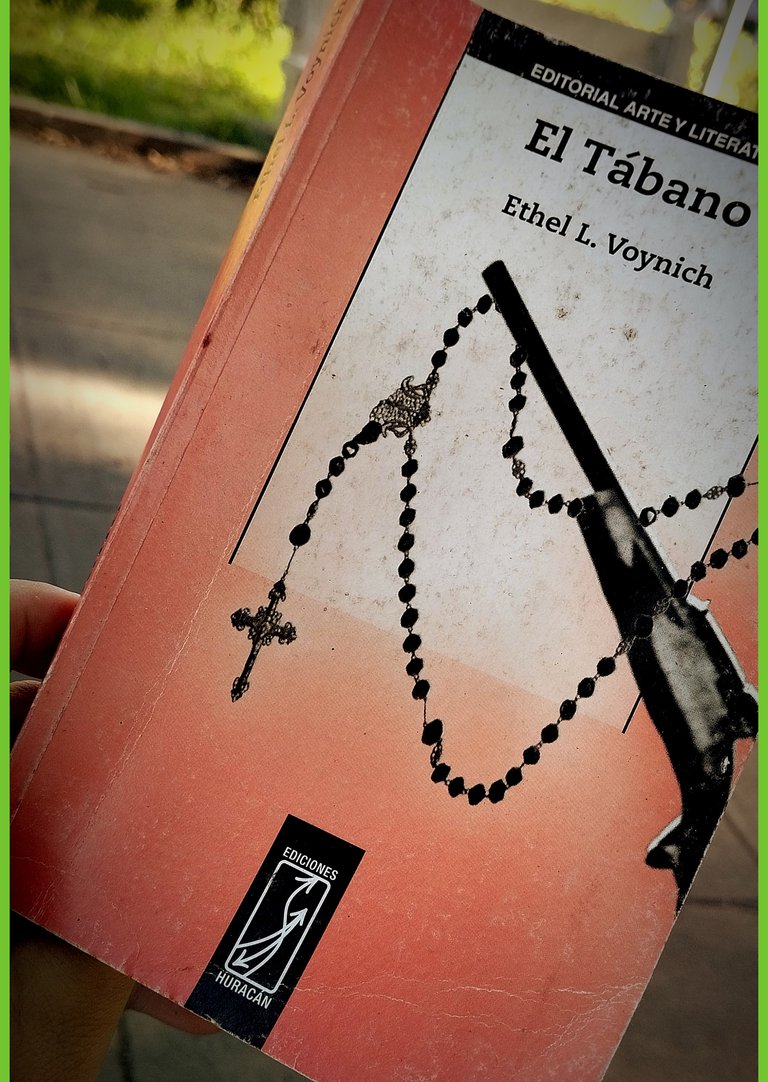
If anyone is looking for a story that moves, challenges, and makes them reflect, they might seek out this novel. And if they can read it under the shade of trees, even better, because some books, like this one, deserve to be accompanied by the whisper of leaves and the weight of the open sky.
✨ 𝑻𝒉𝒂𝒏𝒌𝒔 𝒇𝒐𝒓 𝒓𝒆𝒂𝒅𝒊𝒏𝒈! ✨
𝑰𝒇 𝒚𝒐𝒖 𝒅𝒐𝒏’𝒕 𝒌𝒏𝒐𝒘 𝒎𝒆 𝒚𝒆𝒕. 𝑰’𝒎 𝒂 𝑪𝒖𝒃𝒂𝒏 𝒏𝒆𝒖𝒓𝒐𝒍𝒐𝒈𝒊𝒔𝒕 𝒂𝒏𝒅 𝒘𝒓𝒊𝒕𝒆𝒓, 𝒂 𝒎𝒐𝒕𝒉𝒆𝒓, 𝒂 𝒘𝒐𝒎𝒂𝒏, 𝒂𝒏𝒅 𝒂 𝒅𝒓𝒆𝒂𝒎𝒆𝒓 𝒘𝒉𝒐’𝒔 𝒇𝒐𝒖𝒏𝒅 𝒊𝒏 𝑯𝒊𝒗𝒆 𝒂 𝒃𝒆𝒂𝒖𝒕𝒊𝒇𝒖𝒍 𝒔𝒑𝒂𝒄𝒆 𝒕𝒐 𝒔𝒐𝒂𝒓.
𝑨𝒍𝒍 𝒕𝒆𝒙𝒕 𝒂𝒏𝒅 𝒊𝒎𝒂𝒈𝒆𝒔 𝒂𝒓𝒆 𝒎𝒚 𝒐𝒓𝒊𝒈𝒊𝒏𝒂𝒍 𝒄𝒓𝒆𝒂𝒕𝒊𝒐𝒏𝒔, 100% 𝒉𝒖𝒎𝒂𝒏-𝒎𝒂𝒅𝒆 (𝒏𝒐 𝑨𝑰).
𝑩𝒂𝒏𝒏𝒆𝒓 𝒅𝒆𝒔𝒊𝒈𝒏𝒆𝒅 𝒃𝒚 𝑳𝒖𝒎𝒊𝒊.
𝑳𝒐𝒗𝒆𝒅 𝒕𝒉𝒊𝒔 𝒑𝒐𝒔𝒕? 𝑼𝒑𝒗𝒐𝒕𝒆, 𝒄𝒐𝒎𝒎𝒆𝒏𝒕, 𝒐𝒓 𝒓𝒆𝒃𝒍𝒐𝒈 𝒕𝒐 𝒔𝒑𝒓𝒆𝒂𝒅 𝒕𝒉𝒆 𝒘𝒊𝒏𝒈𝒔 𝒐𝒇 𝒄𝒓𝒆𝒂𝒕𝒊𝒗𝒊𝒕𝒚! 💛

VERSIÓN EN ESPAÑOL

La lectura íntima de El Tábano bajo cielo abierto

Hay libros que exigen ciertos escenarios para ser disfrutados plenamente, y El Tábano de Ethel Lilian Voynich es uno de ellos. Esta no es una novela para devorar entre las cuatro paredes de una habitación, ni bajo la luz artificial de una lámpara; es una obra que pide el aire libre, el murmullo de las hojas y la tranquilidad de un banco de parque. Durante varios días, este libro ha acompañado mis lecturas al aire libre, y debo admitir que pocas experiencias lectoras han sido tan intensas como esta.
El Tábano nos traslada a la Italia del siglo XIX, cuando estaban en auge los movimientos independentistas y revolucionarios contra el dominio austriaco. Precisamente por la simpatía que la autora sentía por esas luchas políticas, eligió esta trama, donde se conjugan el romance, la tragedia y un profundo análisis de la naturaleza humana frente a la opresión.

El eje central del libro está marcado por la evolución del personaje principal, Arthur, un joven idealista que, tras ser traicionado, se transforma en el Tábano, un revolucionario sarcástico, físicamente marcado por el dolor pero incansable en su lucha por la libertad.

Leer El Tábano en un parque no fue una decisión casual. Hay algo en la prosa de Voynich que resuena mejor en espacios abiertos. Quizás sean las descripciones de los paisajes italianos, los diálogos cargados de ideales o las reflexiones sobre el sacrificio, pero la realidad es que, en una tarde tranquila bajo un árbol frondoso, las palabras de Arthur, el protagonista, cobran una fuerza especial.
La novela alterna entre escenarios de tensión política y escenas íntimas muy emotivas. Ese contraste entre la violencia de la lucha revolucionaria y la ternura de personajes como Gemma, el amor de juventud de Arthur, se disfruta mejor cuando se está rodeado de naturaleza. Probablemente, la razón sea que los árboles, como testigos silenciosos, añaden melancolía a la lectura.

Arthur duele. Su transformación de joven inocente a hombre roto e indomable está escrita con una crudeza que impacta. Gemma, por su parte, es un personaje complejo, con su fuerza y su culpa, que la hacen real. Mientras tanto, el padre Montanelli aparece como una figura religiosa atormentada que eleva la novela a niveles casi shakesperianos.
Más allá de la lucha política, esta es una novela sobre la fe y cómo puede ser traicionada. Arthur pierde todo, incluso su identidad, pero encuentra en ese sufrimiento la razón para seguir luchando, utilizando un fino sarcasmo que también funciona como un escudo de honestidad brutal.

Y luego, tras todo lo anterior, emerge la redención como esencia de esta obra, no en el sentido religioso, sino en el humano: Arthur no busca el perdón, sino la justicia. Cierto es que el final es devastador, pero hay una belleza trágica en su sacrificio.
Yo comencé y terminé este libro en el parque. No todos los libros se benefician de un entorno natural, pero El Tábano sí. Siento que, de haberlo leído en la soledad de mi habitación, me habría sentido ahogado. Esta novela habla de esperanza y desesperación, de cicatrices y resistencia, y algo en el aire libre hace que esos temas resuenen con más fuerza.

Si alguien busca una historia que lo conmueva, lo desafíe y lo haga reflexionar, puede buscar esta novela. Y si puede leerla bajo la sombra de los árboles, mejor, porque algunos libros, como este, merecen ser acompañados por el susurro de las hojas y el peso del cielo abierto.
✨ ¡𝑮𝒓𝒂𝒄𝒊𝒂𝒔 𝒑𝒐𝒓 𝒍𝒆𝒆𝒓! ✨
𝑺𝒊 𝒂ú𝒏 𝒏𝒐 𝒎𝒆 𝒄𝒐𝒏𝒐𝒄𝒆𝒔: 𝒔𝒐𝒚 𝒏𝒆𝒖𝒓ó𝒍𝒐𝒈𝒂 𝒚 𝒆𝒔𝒄𝒓𝒊𝒕𝒐𝒓𝒂 𝒄𝒖𝒃𝒂𝒏𝒂, 𝒎𝒂𝒅𝒓𝒆, 𝒎𝒖𝒋𝒆𝒓 𝒚 𝒔𝒐ñ𝒂𝒅𝒐𝒓𝒂 𝒒𝒖𝒆 𝒆𝒏𝒄𝒐𝒏𝒕𝒓ó 𝒆𝒏 𝑯𝒊𝒗𝒆 𝒖𝒏 𝒉𝒆𝒓𝒎𝒐𝒔𝒐 𝒆𝒔𝒑𝒂𝒄𝒊𝒐 𝒑𝒂𝒓𝒂 𝒗𝒐𝒍𝒂𝒓.
𝑬𝒍 𝒕𝒆𝒙𝒕𝒐 𝒚 𝒍𝒂𝒔 𝒊𝒎á𝒈𝒆𝒏𝒆𝒔 𝒔𝒐𝒏 𝒅𝒆 𝒎𝒊 𝒂𝒖𝒕𝒐𝒓í𝒂, 100% 𝒉𝒖𝒎𝒂𝒏𝒐𝒔 (𝒔𝒊𝒏 𝑰𝑨).
𝑩𝒂𝒏𝒏𝒆𝒓 𝒅𝒊𝒔𝒆ñ𝒂𝒅𝒐 𝒑𝒐𝒓 𝑳𝒖𝒎𝒊𝒊.
¿𝑻𝒆 𝒈𝒖𝒔𝒕ó 𝒆𝒔𝒕𝒂 𝒑𝒖𝒃𝒍𝒊𝒄𝒂𝒄𝒊ó𝒏? 𝑽𝒐𝒕𝒂, 𝒄𝒐𝒎𝒆𝒏𝒕𝒂 𝒐 𝒓𝒆𝒃𝒍𝒐𝒈𝒖𝒆𝒂 𝒑𝒂𝒓𝒂 𝒂𝒚𝒖𝒅𝒂𝒓 𝒂 𝒅𝒆𝒔𝒑𝒍𝒆𝒈𝒂𝒓 𝒆𝒔𝒕𝒂𝒔 𝒂𝒍𝒂𝒔. 💛
Este es uno de mis libros favoritos de todos los tiempo
Yo creo que es el libro favorito de muchas generaciones 🤗
Que hermosa sugerencia, no solo la novela detallada así como lo haces sino el entorno que nos brindas.
Ay, amiga, y eso no lo descubrí hace mucho... Las condiciones en qué vivimos me han llevado a descubrir que mejor se lee en un parque que en mi cuarto. Ya sabes de lo que hablo... Y claro, si una novela de esta me acompaña, ni modo, está asegurado el deleite.
Thanks for the support 🍀
What a poetic and beautiful way to describe a reading experience. I loved your reflection on how certain books demand a particular setting to be fully experienced. I'd never heard of to be honest, but your review left me immensely curious and eager to discover it. I've completely captured your passion for this story. Sometimes I try to avoid such heavy reading, but the way you present it, with that mix of tragedy, revolutionary ideals, and human redemption, sounds too powerful to ignore. I'll definitely add it to my to-read list. Thank you so much for this incredible discovery and for the recommendation.
Friend, please go ahead and pick up that book without fear, you'll find one of the most fascinating stories you could ever read. In my country, they made a TV series about this novel a long time ago, I don't think I had even been born yet. I haven't seen it, but everyone: my parents, my sister, fell in love with the story. Then I bought the book, and I also fell in love with it.
And of course, thank you for reading me 🤗🍀
Me gusta la atmósfera que describes. Estoy segura de que será un placer esta lectura.
Siiiiii, intenta leer en un parque, es una experiencia única 🤗
Me parece interesante que uses el contexto para darle mayor valor al libro.